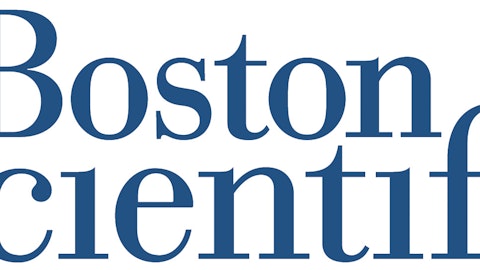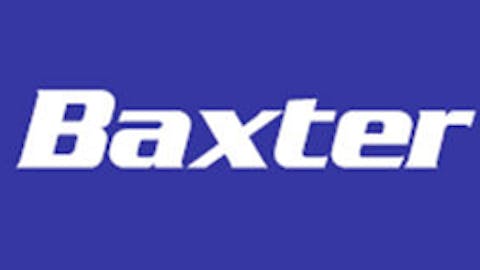Since the beginning of the year, Boston Scientific Corporation (NYSE:BSX) has enjoyed a great rally, climbing from $5.90 per share to nearly $11 per share. Its year-to-date return is nearly 91%, much higher than the S&P 500’s return of only 18.60%. In the first quarter, while Joel Greenblatt and Paul Tudor Jones reduced their positions in this company, Leon Cooperman and Jim Simons increased their exposure to Boston Scientific Corporation (NYSE:BSX). Let’s take a closer look to see whether or not Boston Scientific Corporation (NYSE:BSX) is a good investment opportunity now.
Boston Scientific recovers from Guidant’s bidding war

Boston Scientific Corporation (NYSE:BSX) has tried to recover from the bidding war with Johnson & Johnson (NYSE:JNJ) to takeover Guidant in 2006. The company paid as much as $27.2 billion to acquire Guidant, and a breakup fee of $700 million toJohnson & Johnson (NYSE:JNJ). At that time, the EBITDA multiple did not seem to be high, at around 7. Nevertheless, the company experienced product recalls and lawsuits, driving its share price down significantly. The market values Boston Scientific at as much as 22.37 times its forward earnings.
The highest valuation among its peers
According to Barron’s, Boston Scientific’s long-term growth rate was only 8.4%, a bit lower than the industry average of 10.6%. Moreover, Boston Scientific has a much higher forward earnings valuation than its peers, including St. Jude Medical, Inc. (NYSE:STJ) and Medtronic, Inc. (NYSE:MDT).
The market values St. Jude Medical, Inc. (NYSE:STJ) at a much lower valuation of 13.23 times its forward earnings. St. Jude Medical, Inc. (NYSE:STJ)’s operations focus on four main clinical areas — cardiac rhythm management, cardiovascular, neuromodulation, and atrial fibrillation. The company has been expanding its business in neuromodulation therapy with a $40 million equity investment in Spinal Modulation, which provides new pain management alternatives to patients. The acquisition allows St. Jude Medical, Inc. (NYSE:STJ) to become an exclusive distributor of Spinal Modulation’s Axium Neurostimulator System. Moreover, the company could acquire Spinal Modulation for up to $300 million plus certain revenue-based milestones.
For the full year 2013, St. Jude Medical, Inc. (NYSE:STJ) expects to earn around $3.70 to $3.73 per share. On a constant currency basis, the company’s adjusted EPS could grow as much as 11%-12%. At the current trading price, investors are getting a dividend yield of 1.90%.
Medtronic, Inc. (NYSE:MDT) also has a lower valuation. At $55.60 per share, Medtronic, Inc. (NYSE:MDT) is worth around $56 billion on the market. The market values Medtronic, Inc. (NYSE:MDT) at around 13.50 times its forward earnings. Medtronic, Inc. (NYSE:MDT) is one of the leading companies in medical technology, operating in two main business segments: Cardiac and Vascular Group and Restorative Therapies Group. In fiscal year 2013, the Cardiac and Vascular Group generated nearly $8.7 billion, representing around 52% of its total sales.
In the near future, Medtronic, Inc. (NYSE:MDT) is aiming to derive significant growth from emerging markets. Emerging market revenue is expected to be around 20% of the total revenue in the next five years, with incremental revenue of $2.5 billion. Moreover, the company would keep focusing on cost reduction and improving the operating efficiency. In the period of 2012-2017, Medtronic expects to mitigate pricing pressure and maintain around 75%-76% gross margins. For full year 2018, Medtronic is estimated to produce more than $25 billion in cumulative free cash flow. At the current price, Medtronic offers its shareholders a dividend yield of 2%.
My Foolish take
Boston Scientific does not seem to be a good pick at its current price due to the relatively high forward earnings valuation, a lower long-term growth rate than the industry average, and no dividend payment. Among the three, I like Medtronic the most. Medtronic’s strategy, which focuses on cost savings and on increasing emerging market exposure, should help grow its business and improve the company’s profitability.
Dividend stocks can make you rich. It’s as simple as that. While they don’t garner the notoriety of high-flying growth stocks, they’re also less likely to crash and burn. And over the long term, the compounding effect of the quarterly payouts, as well as their growth, adds up faster than most investors imagine.
The article This Medical Device Maker Seems to Be Quite Expensive originally appeared on Fool.com and is written by Anh Hoang.
Anh HOANG has no position in any stocks mentioned. The Motley Fool owns shares of Medtronic. Anh is a member of The Motley Fool Blog Network — entries represent the personal opinion of the blogger and are not formally edited.
Copyright © 1995 – 2013 The Motley Fool, LLC. All rights reserved. The Motley Fool has a disclosure policy.




